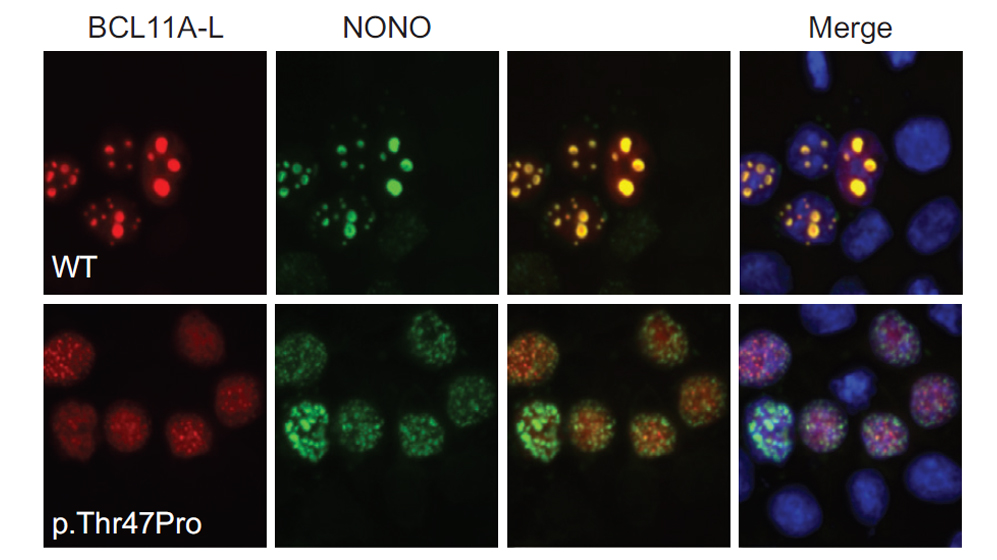New intellectual disability syndrome caused by damage to single gene

The study showed that if one of a person’s two copies of the BCL11A gene is abnormal, or mutated, then they will have the newly described intellectual disability. The team used human cells and a mouse model to show that the body needs two healthy copies of BCL11A to make enough of the BCL11A protein for brain cells to develop normally and work at capacity.
The Sanger Institute’s Deciphering Developmental Disorders research programme, has found many new genes associated with intellectual disability. However, relatively little is known about how these genes work because each genetic cause is so rare. By exploring the mechanism in mice, they have been able to show for the first time the impact of these genes on human development.
A team led by Dr Darren Logan and Professor Simon Fisher worked with nine patients, from the UK and abroad, who have an intellectual disability. They found these people share the same genetic profile and symptoms that they now define as a new clinical syndrome. Each person also had the same unusual blood profile which could be used to help diagnose patients in the future.
“We worked with patients, studied human cells and made a mouse model to translate research from the gene discovery phase into understanding a cause of intellectual disability. We’ve shown that the BCL11A gene does cause an intellectual disability syndrome. It’s an excellent example of gene discovery by patient DNA sequencing paired with experimental investigation to prove a link between gene and outcome that is backed up by cellular and animal studies. We plan to follow this model on an even larger scale in the future, to test the role of many other genes associated with intellectual disability.”
Dr Darren Logan Lead researcher from the Wellcome Trust Sanger Institute
Nearly three in every 100 people in the human population have some form of learning disability and it can have many different genetic causes. The way conditions present in patients varies too, and so each syndrome is poorly understood. The research also revealed that mutated BCL11A influences many other genes important for brain development and function and so explains why people who carry an abnormal copy have intellectual disability.
“We were interested to find severe problems with speech and language development as a consistent feature of the syndrome caused by BCL11A mutations. Studies like ours are beginning to reveal intriguing connections between the biological causes of intellectual disability and disorders of spoken language. And although BCL11A mutations are themselves rare, the gene belongs to a bigger network of genes that are crucial for building a healthy brain, and so it can provide much broader insights into the basis of human cognition, and how this might go wrong during development.”
Professor Simon Fisher Director of the Max Planck Institute for Psycholinguistics
“The contribution of patients and their families to this study was essential for us to understand how a mutation in BCL11A affects them as a group. This is a newly recognized condition so it is important we continue patient studies. We will use experimental resources of cells and mouse models to further investigate how the mutations are influencing other genes, and find potential drug targets. Ultimately, these studies will help us better understand intellectual disability and associated health problems, to ensure that individuals have the best care.”
Dr Cristina Dias A clinical geneticist working in Dr. Logan’s laboratory at the Sanger Institute
More information
Funding
Publications:
Selected websites
The Max Planck Institute for Psycholinguistics
The Max Planck Institute for Psycholinguistics, based in the Netherlands, is an institute of the German Max Planck Society, and is at the forefront of research into the foundations of language. Scientists at the Institute investigate how children and adults acquire languages, the roles of genetic factors, how speaking and listening happen in real time, how the brain processes language, and its connections to cognition and culture. Our approach to the science of language and communication is unique, addressing these fundamental issues at multiple levels, from molecules and cells to circuits and brains, all the way through to behaviour of individuals and populations.
The Wellcome Trust Sanger Institute
The Wellcome Trust Sanger Institute is one of the world's leading genome centres. Through its ability to conduct research at scale, it is able to engage in bold and long-term exploratory projects that are designed to influence and empower medical science globally. Institute research findings, generated through its own research programmes and through its leading role in international consortia, are being used to develop new diagnostics and treatments for human disease.
The Wellcome Trust
The Wellcome Trust is a global charitable foundation dedicated to achieving extraordinary improvements in human and animal health. We support the brightest minds in biomedical research and the medical humanities. Our breadth of support includes public engagement, education and the application of research to improve health. We are independent of both political and commercial interests.


